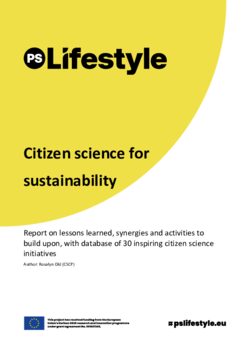D1.1 Citizen science for sustainability
Around the world actors from across sectors and stakeholder groups, together with citizens themselves, are working on changing our ways of living in order to move towards a more sustainable future. Within this, the topic of how to enable people to live more sustainable lifestyles is gaining increasing attention. It is with this focus that we approach the topic of citizen science, and explore how this method can be used towards achieving more positive and sustainable lifestyles of citizens across Europe. T
his report is design to provide an overview of the current context of citizen science for sustainability, the emerging innovations in the field, and what we can learn from the most inspirational examples, as we design new citizen science initiatives in the context of sustainable lifestyles. We derive our main findings from desk-based research, development of 30 inspirational case studies of citizen science projects, and interviews with 27 stakeholders who have been involved in citizen science initiatives.
From a review of existing literature, we see that citizen science is increasingly being used in a range of contexts to both engage citizens in societal issues, and gather new types of data. There is particular potential for citizen science as a method to contribute to a range of sustainability-related topics, including: environment; planning and land use; smart cities and urban environment; spatial planning and land use strategies; food; housing; mobility; consumption and behaviour change. From the analysis of the interviews we conducted, we have shared our findings under 4 key elements of citizen science projects: setting up and reaching out to participants; gathering data from and with citizens; keeping people engaged; and implementing meaningful change. The key learnings from each are set out below.
We see that there are several benefits of having a strong, collaborative network of organisations working together to support the project to achieve its shared aims. Different partners can support the project in a range of ways: provision of resources/tools/practical help/data, promotion and dissemination of information, policy/decision-maker support, and expert knowledge. Additionally, time is needed to adapt to a common methodology and ways of working between partners, who may be used to communicating in different ‘languages’. Municipalities are important actors and therefore valuable to engage in the citizen science process, and there are a number of ways in which they in particular can collaborate, for example, in supporting implementation and follow-on actions. In terms of gathering participants, it is important to understand participants’ life circumstances and limitations, cultural values and backgrounds, and to use a range of methods and tailored communications to reach and engage with different groups. A key set of stakeholders to involve are local citizens’ networks, groups and associations, and collaboration with other organisations can help you to reach participants from a range of backgrounds and contexts. Greater participant numbers and diversity may be helped by identifying and working with multipliers.
Publication Date: 31 Jan 2022
This project has received funding from the European Union’s Horizon 2020 research and innovation programme under grant agreement No 101037342.
